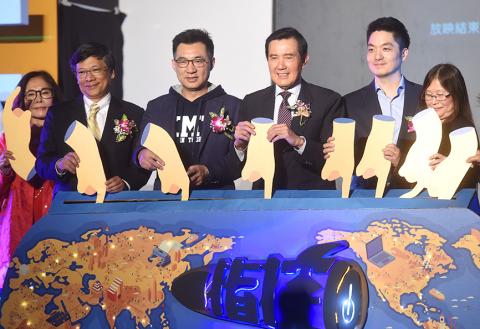Control Yuan member Chen Shih-meng (陳師孟) yesterday launched an investigation of former president Ma Ying-jeou (馬英九) for alleged abuse of power and interference in the judiciary over his administration’s probe of a prosecutor who indicted Ma on corruption charges when he was Taipei mayor.
The Control Yuan said in a statement that Chen intends to determine whether Ma went beyond his constitutional authority and interfered in the judiciary when he took action against High Prosecutors’ Office Prosecutor Hou Kuan-jen (侯寬仁) after being sworn in as president in 2008.
Chen also plans to investigate whether then-minister of justice Wang Ching-feng (王清峰) was biased against Hou and whether office prosecutors responsible for an internal probe into Hou’s handling of Ma’s corruption case were influenced by the executive branch, the statement said.

Photo: Chien Jung-fong, Taipei Times
Chen said he plans to interview Hou, Ma and Wang.
The Control Yuan was referring to Hou’s indictment of Ma in February 2007 over an alleged misappropriation of NT$11 million (US$376,313 at the current exchange rate) from Ma’s special allowance during his eight-year tenure as Taipei mayor.
Hou had appealed two lower courts’ not-guilty verdicts, until the Supreme Court made the ruling final in April 2008.
In January 2008, Ma filed a lawsuit against Hou, accusing him of malfeasance for fraudulently misrepresenting Ma’s witness statements. Hou was found not guilty.
In January 2010, Ma’s lawyer, C.V. Chen (陳長文) wrote an op-ed calling on the Ministry of Justice to seek compensation from Hou for what he called negligence in the handling of a 1997 fraud case.
Ma later reportedly instructed Wang to read the article and “clarify the matter.”
A month later, Wang asked the office to look into Hou’s handling of Ma’s witness statements.
When the office cleared Hou of any wrongdoing, Wang pressed the issue until the prosecutor was reprimanded.
Former deputy minister of justice Lee Chin-yung (李進勇) also made similar accusations against Ma in 2013.
Ma’s office yesterday said that C.V. Chen’s op-ed listed a number of suggestions for the judiciary, citing as an example a Control Yuan probe that found Hou guilty of several irregularities when handling the fraud case, which had been closed by the time the article was published.
“During his time as president, Ma often referred criticism and suggestions from various sectors of society to his Cabinet members, in the hopes that they could listen to public opinion and factor it into their policymaking process,” Ma’s office spokeswoman Hsu Chiao-hsin (徐巧芯) said.
Hsu said that if Chen Shih-meng equated listening to public opinion with interference in an individual judicial case, or launched the investigation into Ma only for the sake of doing so, his actions were bound to meet with public criticism.
Additional reporting by CNA

AGING: As of last month, people aged 65 or older accounted for 20.06 percent of the total population and the number of couples who got married fell by 18,685 from 2024 Taiwan has surpassed South Korea as the country least willing to have children, with an annual crude birthrate of 4.62 per 1,000 people, Ministry of the Interior data showed yesterday. The nation was previously ranked the second-lowest country in terms of total fertility rate, or the average number of children a woman has in her lifetime. However, South Korea’s fertility rate began to recover from 2023, with total fertility rate rising from 0.72 and estimated to reach 0.82 to 0.85 by last year, and the crude birthrate projected at 6.7 per 1,000 people. Japan’s crude birthrate was projected to fall below six,

Conflict with Taiwan could leave China with “massive economic disruption, catastrophic military losses, significant social unrest, and devastating sanctions,” a US think tank said in a report released on Monday. The German Marshall Fund released a report titled If China Attacks Taiwan: The Consequences for China of “Minor Conflict” and “Major War” Scenarios. The report details the “massive” economic, military, social and international costs to China in the event of a minor conflict or major war with Taiwan, estimating that the Chinese People’s Liberation Army (PLA) could sustain losses of more than half of its active-duty ground forces, including 100,000 troops. Understanding Chinese

US President Donald Trump in an interview with the New York Times published on Thursday said that “it’s up to” Chinese President Xi Jinping (習近平) what China does on Taiwan, but that he would be “very unhappy” with a change in the “status quo.” “He [Xi] considers it to be a part of China, and that’s up to him what he’s going to be doing, but I’ve expressed to him that I would be very unhappy if he did that, and I don’t think he’ll do that. I hope he doesn’t do that,” Trump said. Trump made the comments in the context

SELF-DEFENSE: Tokyo has accelerated its spending goal and its defense minister said the nation needs to discuss whether it should develop nuclear-powered submarines China is ramping up objections to what it sees as Japan’s desire to acquire nuclear weapons, despite Tokyo’s longstanding renunciation of such arms, deepening another fissure in the two neighbors’ increasingly tense ties. In what appears to be a concerted effort, China’s foreign and defense ministries issued statements on Thursday condemning alleged remilitarism efforts by Tokyo. The remarks came as two of the country’s top think tanks jointly issued a 29-page report framing actions by “right-wing forces” in Japan as posing a “serious threat” to world peace. While that report did not define “right-wing forces,” the Chinese Ministry of Foreign Affairs was